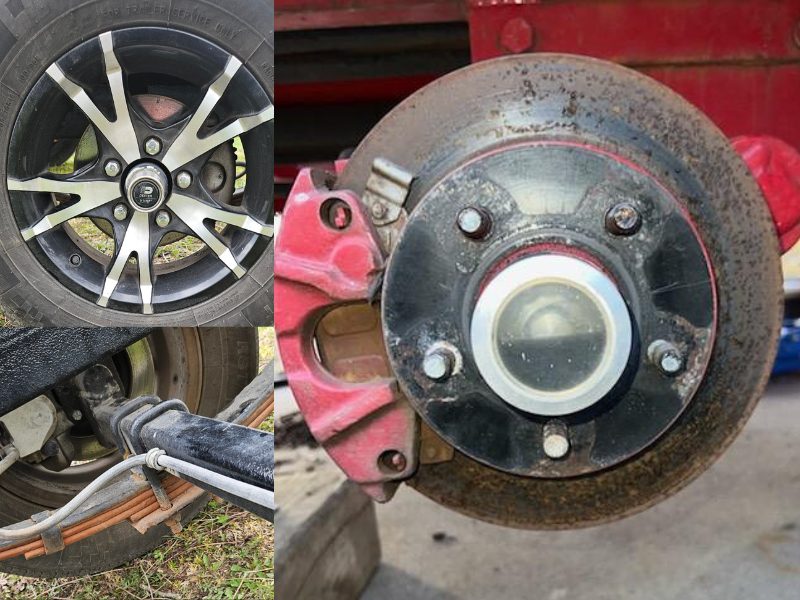Electric Over Hydraulic Disc Brakes for Trailers
When it comes to hauling heavy loads safely, few components matter as much as your trailer’s braking system. For years, drum brakes have been the standard on construction, landscaping, and utility trailers. But more and more operators are making the switch to hydraulic disc brakes — and for good reason. In this post, we’ll dive into what hydraulic disc brakes are, how they work, their advantages over drum brakes, and what you should consider if you’re thinking about upgrading.
How Hydraulic Disc Brakes Work
Hydraulic disc brakes use hydraulic pressure, generated by a brake actuator, to force pistons inside a caliper against brake pads. These pads clamp onto a rotor attached to the trailer hub, creating friction that slows the trailer down. The system is closed and pressurized, delivering consistent braking force with less fade than mechanical or drum-style systems.
Key components include:
- Electric-over-hydraulic actuator (converts brake controller signals to hydraulic pressure)
- Brake calipers (house pistons and pads)
- Rotors (integral or slip-over style)
- Hydraulic lines and fittings
- Reservoir and fluid
Why Make the Switch from Drum to Disc?
1. Stopping Power
Disc brakes generate more consistent and powerful stopping force than drum brakes. They handle heat better, which reduces brake fade on long downhill grades — crucial for heavy equipment trailers and landscape rigs in hilly areas.
2. Shorter Stopping Distances
Tests show disc brake systems can cut stopping distances by 30% or more compared to drums. That margin makes a real difference when you’re towing a skid steer or a fully loaded dump trailer.
3. Lower Maintenance
- Disc brakes are easier to inspect — pads and rotors are visible without pulling the hub.
- Fewer moving parts mean fewer points of failure.
- Pad replacement is faster and less messy than shoe replacement inside a drum.
4. Durability in Harsh Conditions
Construction and landscaping trailers see a lot of dirt, water, and mud. Drum brakes tend to trap debris, which accelerates wear. Disc brakes shed water and dirt more effectively, keeping the friction surfaces cleaner.
5. Improved Safety
When you’re hauling thousands of pounds of material, equipment, or machinery, every foot of stopping distance counts. Disc brakes provide smoother, straighter stops that help protect operators, crews, and other drivers.
Things to Consider Before Upgrading
1. Axle Compatibility
Not all axles are designed to accept disc brake kits. You’ll need to confirm your trailer’s axle rating (usually 7K, 10K, or 12K for heavy-duty trailers) and caliper mounting flange type.
2. Electric-Over-Hydraulic Actuator
Switching from drum brakes (often electric) to hydraulic disc brakes requires installing an actuator that converts your in-cab brake controller signals into hydraulic pressure. Units like Hydrastar or Dexter DX series are popular choices.
3. Hydraulic Lines
You’ll need new hydraulic brake lines, tees, and fittings sized to your trailer’s length and number of axles.
4. Initial Cost vs. Long-Term Savings
Disc brake conversion kits and actuators cost more upfront than replacing drums. However, lower maintenance, longer lifespan, and improved safety make them a worthwhile investment for trailers that see daily use.
5. Professional Installation
Some experienced operators handle conversions themselves, but for many fleet owners and contractors, professional installation ensures everything is plumbed, bled, and torqued correctly.
Is It Worth It?
For contractors, landscapers, and anyone who regularly hauls heavy loads, the benefits of disc brakes often outweigh the cost. You get stronger, more reliable stopping power, less downtime from maintenance, and peace of mind knowing your trailer can stop as hard as your truck.
If you’re looking to maximize uptime and safety on the road, making the switch to hydraulic disc brakes is one of the smartest upgrades you can invest in. Call (515) 608-8040 today for a quote on a hydraulic disc brake kit for your axle!
